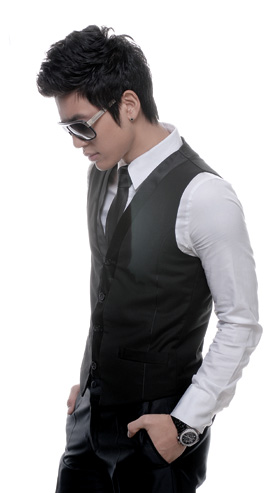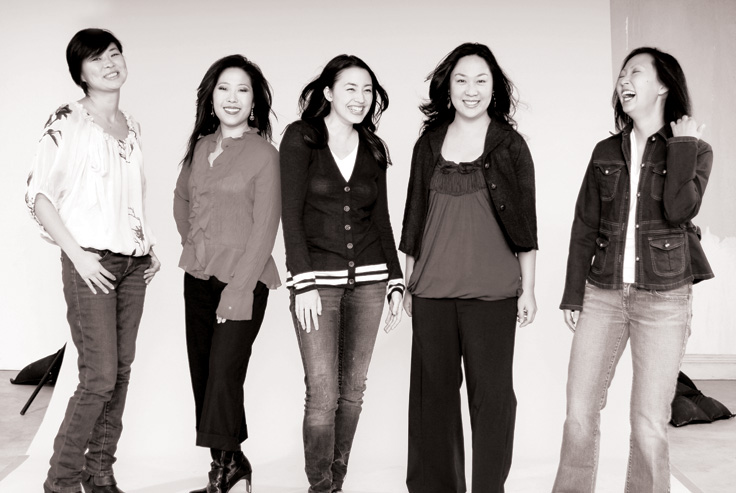The Making Of An International Star
By Kai Ma
Photographs by Eric Sueyoshi
He strolls into Le Cercle, a multi-level nightclub known for its glass-and-leather VIP lounge and laser-lit floor. His hat is tilted low over the brow and his hair is slightly tousled. Inside, a crew is preparing to shoot his first U.S.-produced music video, while near the door, his managers chain-smoke by a clogged Koreatown thoroughfare that resembles not just Los Angeles, but a bustling pocket in Seoul.
A Korean club may sound like an ill-conceived shoot location for a K-pop singer who’s aiming to prompt mainstream American buzz. But for the Seoul-reared Se7en, who is already an award-winning pop darling in Asia, it was important that his video reflected his far-flung roots.
Not that anyone will notice. After the 18-hour shoot wraps, it’s clear that Se7en’s latest release is the product of an elaborate transformation tailored toward promoting the next Made-in-America hit. Turns out, the only Korean portion of the video is, well, Se7en’s Korean face.
[ad#336]
Slated for a March release, Se7en’s first American album (title TBA) is being produced by the U.S.-based Red Queen Media and Rodney “Darkchild” Jerkins, a Grammy Award-winning record producer who has worked with Beyoncé, Janet Jackson and Ludacris. Other producers include Rich Harrison, who has also produced Beyoncé, and Noize Trip, who has produced Fergie and the Black Eyed Peas. The 12 songs — all recorded in English — will feature joint tracks with Fabolous, Far East Movement, Three 6 Mafia, and for the single, Lil’ Kim, who sings in the video as Se7en’s female counterpart.
But before a cornrowed Lil’ Kim even arrives in her vinyl, fleshy get-up, Se7en has work to do.
On a high stage, Se7en stands in front of a screen of flashing futuristic graphics that include a (wait for it) numeral 7. His tresses are now slicked back with gel, and his body is cloaked in a black Marc Jacobs Euro-cut suit. Large diamond studs adorn both ears.
Blaring from the speakers is his single “Girls,” a catchy, energetic track that carries a whiff of Korean pop while fusing the elements of hip-hop and R&B that Americans are more than familiar with.
While paying homage to the fairer sex, Se7en’s graceful body glides and pops, his head rolls with fluidity, and his white Louis Vuitton sneakers fly in the air during the occasional circle-kick. Hours later, video extras flood onto the main floor. Women in leopard-print micro-minis and plunging necklines booty-grind to the beat, and in the background, men in fauxhawks gyrate to the same tune. Se7en emerges from a fog, surrounded by those who want to be near him, which the 24-year-old artist has long been accustomed to.
[ad#336]
Already described as the “Korean Justin Timberlake,” Se7en is known for an athletic form of freestyle and breakdancing, and a signature handstand that he claims he’ll no longer tackle now that he’s “too old.” But when asked what American artists he wants to model his career after, Se7en hesitates. “I like Justin, I like Usher,” he says, in a soft speaking voice. But, “I want to do my own thing. My role model is Se7en. Myself. I moved here to make an album because all singers in Korea and Asia … we want to go for the American Dream. This was my dream back then, and is my dream, still.”
It’s a dream that’s already included collaborations with an American rap icon, sold-out shows in Seattle, New York and Washington D.C., and an entourage of producers that zip him around in a Mercedes Benz S550 Sport AMG.
It’s a flashier, more glamorous version of the immigrant experience, but nonetheless, there are some serious bootstraps to be pulled. Here, Se7en doesn’t want to simply survive. He wants to be a star.
***
A product of ‘80s American Top 40, first stumbling upon Michael Jackson’s LPs as a tot, Choi Dong Wook began imitating the King of Pop’s moves at the age of 5. He was inspired by the sound, the backslide, even the glittering solo glove. “I just liked it,” the artist recalls, “and was imitating his style, alone in my bedroom. The music was exciting.” As a teen, he went to dance school for one month: “I asked my mother, ‘Aw, please, just give me 150 bucks to take this hip-hop dance class. My parents knew that I loved music, so they gave me the money. That was the start.”
When describing his childhood, it’s as if musical instruments were just lying around the house, waiting to be mastered. Growing up, he played the trumpet, piano, guitar, and keyboard and also learned the clarinet and flute from his two sisters. During elementary school, he played the trombone and drums. “I played everything, really,” he recalls. As for his voice, it’s fair to say a singing gene was inherited. “My father has a good voice,” he says, adding with a laugh, “But, only my father.”
At 14, he was picked up by YG Entertainment, and then spent four years training until his Seoul debut in 2002. He was christened Se7en, after the universally fortuitous digit.
[ad#336]
What followed: Four albums dropped in South Korea, two in Japan, nine Korean Music Awards equivalent to Grammys, nods from MTV Asia, and sold-out performances in arenas boasting 20,000 seats. He was also cast as the leading male for the Korean drama, Goong S, a spinoff of Goong. In South Korea, a bodyguard is now required to protect him from his obsessive mostly-female fans.
To transform Se7en into an Asian superstar with global appeal, his management team moved him from Seoul to Los Angeles. He initially lived with his producer in Studio City, then with his personal trainer, and now lives in a bachelor pad in downtown L.A.
In six months, he learned English through a team of tutors and dialect coaches, while picking up slang from the songwriters and producers he works with (he’s also fluent in Japanese). And, his quick command of the language has much to do with watching every episode of HBO’s Entourage, with the aid of Korean subtitles. He also watches a lot of movies — “especially action, because there’s not too much talk,” he says — and reads “third-grade American books,” along with a host of magazines. “I go to Ralphs and buy every magazine, every week,” he says. “Star, People, all the tabloids.”
Similar to Justin Timberlake, Se7en has the plump kisser and swagger that three-piece suits were made for. But Se7en isn’t the first to be coined the Korean reincarnation of the former ‘N Syncer. Or the “Korean Usher.” For years now, those titles have referred to pop star Rain, who along with K-pop princess BoA, is one of the biggest Asian names to confront the U.S. market.
Yet Se7en’s management team is critical of these artists’ approach.
“There’s been no good, solid effort in bringing an Asian artist to the United States,” says Jason Oh of Red Queen Media, an executive producer of the next album. “If Rain and BoA blow up, that helps us because we’re in this together. But it’s not going to work to just throw an Asian artist into the mix, without having them learn English or [understand] American culture.”
[ad#336]
Oh, therefore, is banking on a strategy that in the past, has helped to propel minority artists such as Jennifer Lopez and Shakira: Reaching out to the ethnic community first, then using that as a jumping board to penetrate the mainstream market. “[Se7en’s] Asian fan base is solidified and strong — and it would be unwise to abandon them now,” says Oh. “Asians are the biggest haters; they don’t want a F.O.B. that sounds like sh-t. You have to win over your core audience first. For Se7en, that’s the Asians and Korean Americans. Then, he can move on from there.”
Last year, Esna Yoon, 21, watched Se7en take the stage in Los Angeles. She enjoyed the performance, but believes he has much to learn about who his audience is in the United States. “His presence was still K-pop-ish,” says Yoon, a singer and dancer herself. “Here, you really need to have that groove. He needs to deliver from the soul.”
Expecting an Asian star to transcend Asian-only popularity is still a coin toss, even for a knockout who knows how to hold a note. Which is partly why in the U.S. of A., Se7en’s managers tend to downplay his Asian stardom. “Korean artists are Gods in Asia,” says Oh. But, “Se7en is a humble kid that doesn’t go around thinking he’s the sh-t. He’s not a diva.” And, he adds as a joke, “If this doesn’t work out, we can always turn him into a porn star.”
***
There’s a story from the earlier days of Se7en’s career that says something about his ability to deliver each song to the end. During a performance in Korea, he was singing “Baby I Like You Like That” on a dark, star-shaped stage with multiple levels. He jumped off one portion of the stage, assuming that there was another landing right underneath.
But, there wasn’t. And so Se7en plunged 15 feet onto a cement floor, fell over and broke his hand. From his audience’s point of view, he’d vanished from the stage. “Boom! He fell,” recalls Oh. “The funny thing was that he kept on singing. That’s a serious professional.” Adds Se7en, “I just kept going. I had to. And then I walked up back to the stage and finished the song.”
It’s this unabashed determination and pluck that is required to clinch any dream in America — especially in the cutthroat world of music, where talent is plentiful and even more expendable. Se7en is more than aware of this cautionary tale. Last month, after visiting the KoreAm headquarters for a photo shoot, he agreed to proceed despite some unfortunate miscommunication about wardrobe. But whether it’s for a shoot or song, it wouldn’t be like Se7en to not seal the deal. (Unlike a diva, indeed).
Afterwards, Se7en and Oh gathered at a Japanese ramen joint in Gardena, Calif. During the meal, Se7en ticks off Prince as one of his American influences. Oh, sitting next to him, recalls another story. “I was at a Prince concert in Washington, D.C.,” he says, “and I saw a whole stadium of girls sobbing.” Tilting his head towards Se7en, he adds, “There are girls crying over this guy, too.”
When Se7en debuted, he was 18 years old. Since, his predominately female devotees have hailed from South Korea, Japan, Hong Kong — all over Asia, really — and yes, they do cry for the now-Asian sex symbol. And like Prince, his followers represent quite the range.
“The oldest fan I met was in her 70s,” says Se7en, who speaks with hardly an accent, but tends to still pepper his English with Korean phrases. “A halmeoni. She came to my concert in a wheelchair. But, I don’t know if she was crying.”
In the States, where Se7en has been based for almost two years, he still lives in relative obscurity — a reality that his managers believe will change once his video is released. It’s still unclear whether America is ready to embrace a Korean pop crossover, but it makes sense that the Asian superstar has found a home here. It is the country where his favorite musicians and artists hail. “I love pop and R&B,” he says, citing Beyoncé, Alicia Keys and Rihanna. “All the women,” he adds with a sheepish grin.
Is he ready to compete with the American pop icons he holds in high regard?
“That’s why I’m here,” he says. As far as the challenge of having to penetrate the market as an Asian, “that’s the hardest part,” he admits. “But I’m a singer, not just an Asian singer. It’s about my music. And music is universal.”







